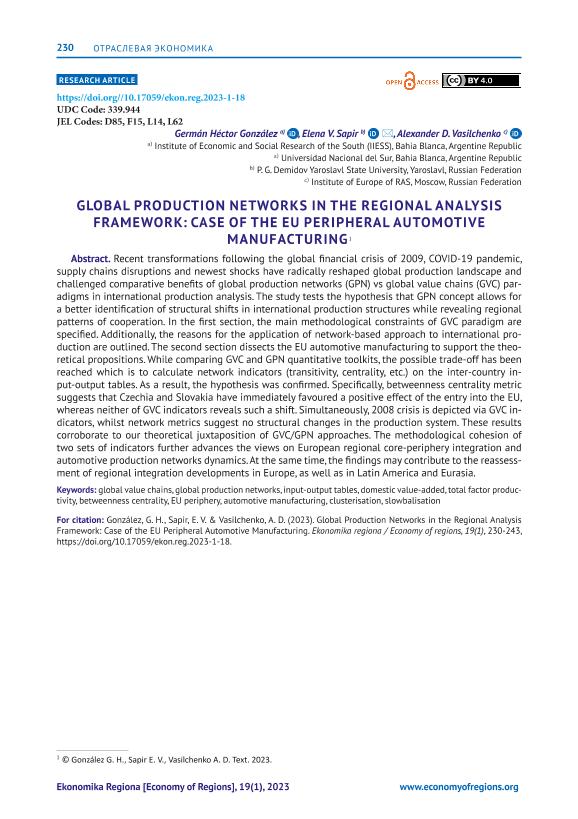Mostrar el registro sencillo del ítem
dc.contributor.author
González, Germán Héctor

dc.contributor.author
Sapir, Elena
dc.contributor.author
Vasilchenko, Alexander
dc.date.available
2023-12-26T13:32:04Z
dc.date.issued
2023-03-30
dc.identifier.citation
González, Germán Héctor; Sapir, Elena; Vasilchenko, Alexander; Global Production Networks in the Regional Analysis Framework: Case of EU Peripheral Automotive Manufacturing; Institute of Economics of the Ural Branch of the Russian Academy of Sciences; Economy of Regions; 19; 1; 30-3-2023; 230-243
dc.identifier.issn
2072-6414
dc.identifier.uri
http://hdl.handle.net/11336/221377
dc.description.abstract
Recent transformations following the global financial crisis of 2009, COVID-19 pandemic, supply chains disruptions and newest shocks have radically reshaped global production landscape and challenged comparative benefits of global production networks (GPN) vs global value chains (GVC) paradigms in international production analysis. The study tests the hypothesis that GPN concept allows for a better identification of structural shifts in international production structures while revealing regional patterns of cooperation. In the first section, the main methodological constraints of GVC paradigm are specified. Additionally, the reasons for the application of network-based approach to international production are outlined. The second section dissects the EU automotive manufacturing to support the theoretical propositions. While comparing GVC and GPN quantitative toolkits, the possible trade-off has been reached which is to calculate network indicators (transitivity, centrality, etc.) on the inter-country input-output tables. As a result, the hypothesis was confirmed. Specifically, betweenness centrality metric suggests that Czechia and Slovakia have immediately favoured a positive effect of the entry into the EU, whereas neither of GVC indicators reveals such a shift. Simultaneously, 2008 crisis is depicted via GVC indicators, whilst network metrics suggest no structural changes in the production system. These results corroborate to our theoretical juxtaposition of GVC/GPN approaches. The methodological cohesion of two sets of indicators further advances the views on European regional core-periphery integration and automotive production networks dynamics. At the same time, the findings may contribute to the reassessment of regional integration developments in Europe, as well as in Latin America and Eurasia.
dc.description.abstract
Экономические изменения вследствие глобального финансового кризиса 2009 г., пандемии COVID-19, сбоев в цепочках поставок и других потрясений привели к радикальной трансформации производственного ландшафта. Возник вопрос относительно сравнительных преимуществ парадигм глобальных производственных сетей (ГПС) и глобальных цепочек создания стоимости (ГЦСС) в анализе международного производства. В связи с этим была проверена гипотеза, предполагающая, что концепция ГПС позволяет лучше идентифицировать сдвиги, возникающие в международных производственных структурах, при этом выявляются региональные модели сотрудничества. В первом разделе рассмотрены основные методологические ограничения концепции ГЦСС, а также изложены причины применения сетевого подхода к анализу международного производства. Для подтверждения теоретических предположений во втором разделе была исследована сфера автомобилестроения в Европейском союзе. При сравнении количественных инструментов ГПС и ГЦСС был достигнут возможный компромисс, заключающийся в расчете сетевых показателей (транзитивность, центральность и т. д.) с использованием межстрановых таблиц «затраты — выпуск». В результате исследования поставленная гипотеза была подтверждена. В частности, показатель центральности продемонстрировал положительный эффект от вступления в ЕС для Чехии и Словакии, тогда как ни один из индикаторов ГЦСС не показал подобных сдвигов. В то же время индикаторы ГЦСС отметили влияние кризиса 2008 г., тогда как сетевые показатели свидетельствуют об отсутствии структурных изменений в производственной системе в исследуемый период. Полученные данные подтверждают теоретическое сопоставление подходов ГПС и ГЦСС. Методологическое единство двух наборов показателей позволило шире взглянуть на европейскую региональную интеграцию ядра и периферии и динамику сетей автомобилестроения. Результаты исследования могут быть использованы для переосмысления процессов региональной интеграции как в Европе, так и в Латинской Америке и Евразии.
dc.format
application/pdf
dc.language.iso
eng
dc.publisher
Institute of Economics of the Ural Branch of the Russian Academy of Sciences
dc.rights
info:eu-repo/semantics/openAccess
dc.rights.uri
https://creativecommons.org/licenses/by/2.5/ar/
dc.subject
AUTOMOTIVE MANUFACTURING
dc.subject
BETWEENNESS CENTRALITY
dc.subject
CLUSTERISATION
dc.subject
DOMESTIC VALUE-ADDED
dc.subject
EU PERIPHERY
dc.subject
GLOBAL PRODUCTION NETWORKS
dc.subject
GLOBAL VALUE CHAINS
dc.subject
INPUT-OUTPUT TABLES
dc.subject
SLOWBALISATION
dc.subject
TOTAL FACTOR PRODUCTIVITY
dc.subject.classification
Organización Industrial

dc.subject.classification
Economía y Negocios

dc.subject.classification
CIENCIAS SOCIALES

dc.title
Global Production Networks in the Regional Analysis Framework: Case of EU Peripheral Automotive Manufacturing
dc.title
Региональный анализ глобальных производственных сетей: опыт автомобилестроения в периферийных странах европейского союза
dc.type
info:eu-repo/semantics/article
dc.type
info:ar-repo/semantics/artículo
dc.type
info:eu-repo/semantics/publishedVersion
dc.date.updated
2023-12-07T13:39:16Z
dc.identifier.eissn
2411-1406
dc.journal.volume
19
dc.journal.number
1
dc.journal.pagination
230-243
dc.journal.pais
Rusia

dc.description.fil
Fil: González, Germán Héctor. Consejo Nacional de Investigaciones Científicas y Técnicas. Centro Científico Tecnológico Conicet - Bahía Blanca. Instituto de Investigaciones Económicas y Sociales del Sur. Universidad Nacional del Sur. Departamento de Economía. Instituto de Investigaciones Económicas y Sociales del Sur; Argentina
dc.description.fil
Fil: Sapir, Elena. No especifíca;
dc.description.fil
Fil: Vasilchenko, Alexander. No especifíca;
dc.journal.title
Economy of Regions
dc.relation.alternativeid
info:eu-repo/semantics/altIdentifier/url/https://economyofregions.org/ojs/index.php/er/article/view/522
dc.relation.alternativeid
info:eu-repo/semantics/altIdentifier/doi/https://doi.org/10.17059/ekon.reg.2023-1-18
Archivos asociados
